If you’re a fan of bread and potatoes, you’re going to love this Punjabi Aloo Paratha or Aloo ka Paratha. Sometimes spelled Alu Paratha, this potato stuffed flatbread is a popular Indian breakfast that combines two of my favorite starches in a single delectable package. Crisp on the outside and tender on the inside, this humble meal is as comforting as a hug. What’s not to love?
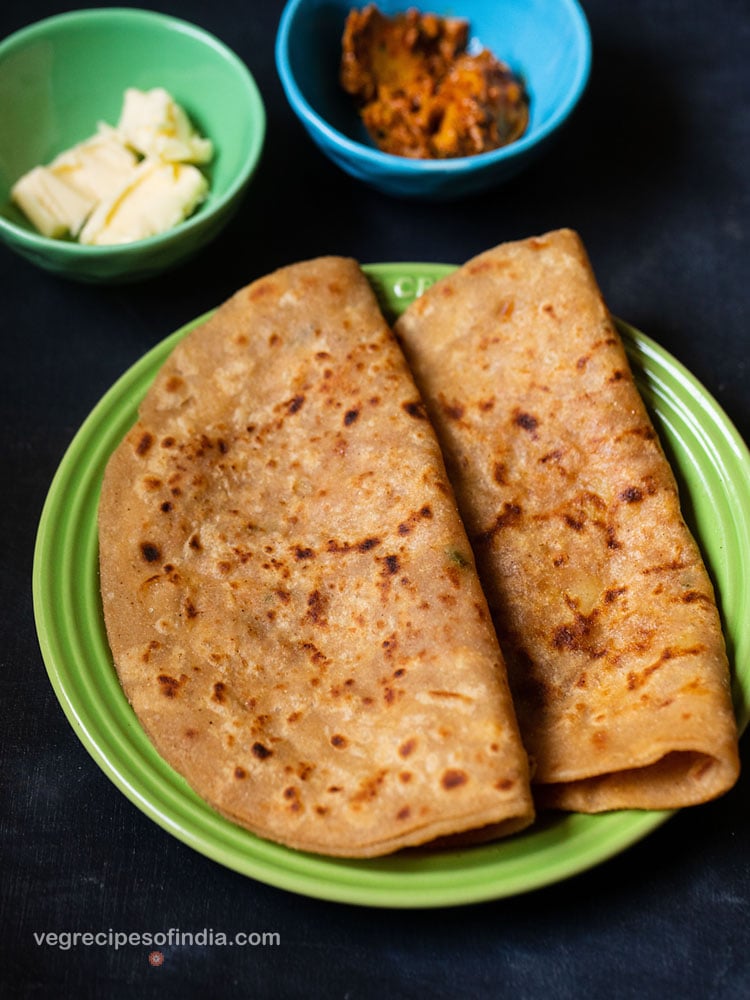
What is Aloo Paratha
Aloo means “potato” and paratha means “flatbread” in Hindi, so the name is quite telling: aloo paratha is an unleavened whole wheat flatbread stuffed with a savory, spiced, mashed potato filling.
Though there are many variations of stuffed paratha, many folks like aloo ke parathe above all others. In my home, Gobi Paratha and aloo paratha win all the superlatives.
Hailing from Punjab, India, this is one of my favorite breakfasts of all time! It also happens to be one of the first recipes I learned from my Punjabi mother-in-law, so it holds a special place in my heart.
In Punjabi families, parathas are made with lots of love and affection, not to mention lots of ghee and homemade butter (makhan). If you lean towards a healthier lifestyle, you can easily opt to roast aloo paratha in oil and serve them with curd (plain yogurt) instead of butter.
In this post, I’ll show you two different methods of rolling the potato parathas. There’s no need to be intimidated; this recipe is really quite simple!
To make aloo ka paratha you need two main components:
- Dough made from whole wheat flour – A basic dough is made with whole wheat flour (atta), salt, oil and water. Making this unleavened dough is very easy and you can either knead it with your hands or in a stand mixer. Do use the Indian atta which is finely ground flour made in a chakki or a stone mill.
- Mashed potato stuffing – Potatoes are boiled, peeled and then mashed. The mashed potatoes are seasoned with herbs, spices and salt, and then are stuffed in a rolled dough before being roasted or fried.
How to make Aloo Paratha
Before you can make these delicious stuffed parathas, you need to prepare the potato stuffing and make the whole wheat dough.
Make Potato Stuffing
1. First, boil or steam 4 medium-sized potatoes in a pressure cooker, steamer or electric cooker. Add enough water in a 2-litre pressure cooker or pan to just barely cover the potatoes.
- For cooking in a pressure cooker – On a medium heat, cook the potatoes in water for 3 to 4 whistles. When the pressure settles down naturally, remove the lid and drain the water very well. Allow the potatoes to cool enough to handle and then peel them.
- For cooking in a pan – Cover the pan and cook potatoes in water till fork tender. For this method, it helps to peel the potatoes and chop them in 2 inch cubes before boiling because they will cook faster than whole potatoes. Using a colander, drain all the water and allow the potatoes to cool.
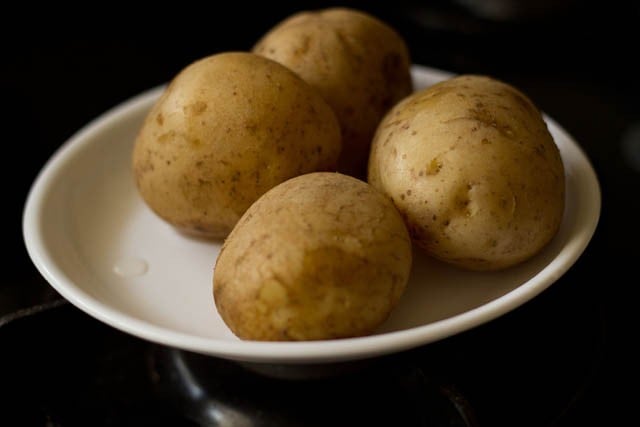
2. If you haven’t done so yet, peel and chop the warm potatoes. Then mash the potatoes with a potato masher.
If you don’t have a potato masher, use a box grater to grate them and then mash the potatoes with a fork.
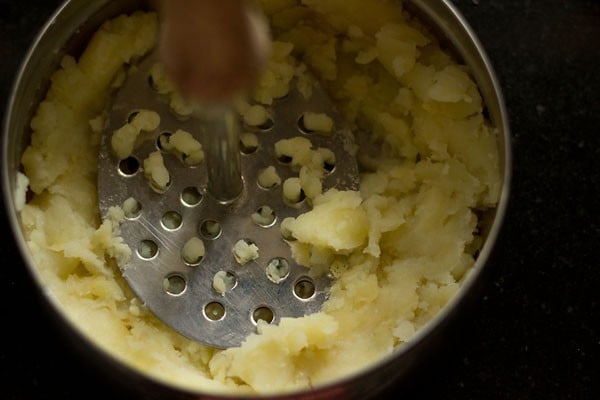
3. The potatoes should be mashed very well, with no lumps, chunks or bits. Any lumps in the mix will cause the stuffing to leak out of the dough when rolling.
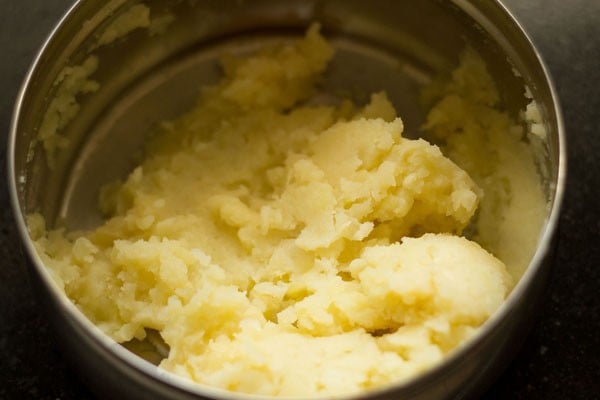
4. Now add the following ingredients, feeling free to vary the spices as you like.
- ½ to 1 teaspoon finely chopped green chillies (1 to 2 green chilies) or serrano peppers
- ¼ to ½ teaspoon punjabi garam masala powder or Garam Masala Powder
- ¼ to ½ teaspoon kashmiri red chilli powder or cayenne pepper or paprika (optional)
- ½ to 1 teaspoon dry mango powder (amchur powder) – or use lemon juice instead
- salt according to your taste
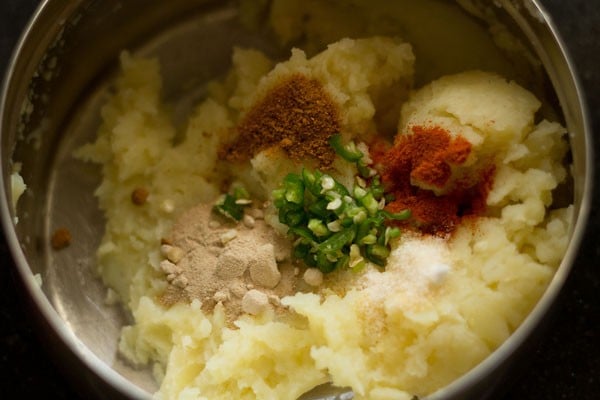
5. With a spoon, thoroughly mix the ground spices and green chilies into the mashed potatoes to get an even mixture. Set the prepared aloo stuffing aside.
Do check the taste of the spiced mashed potato stuffing, adjusting the salt, red chilli powder, or dry mango powder if needed.
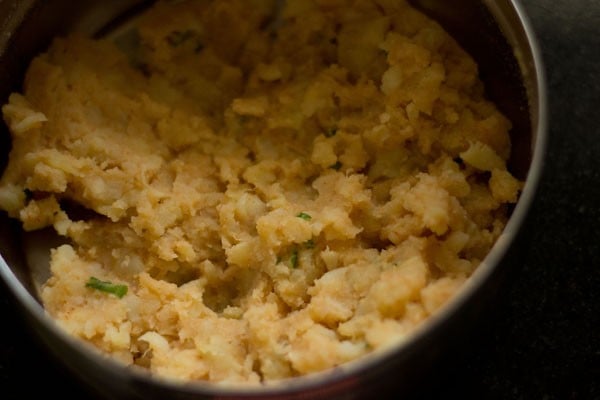
Make The Dough
6. In a separate bowl, add 2 cups whole wheat flour (atta). Make a well in the center. Add ½ teaspoon salt (or to taste), 1 tablespoon oil or ghee, and roughly ⅓ to ½ cup water.
Note: Be sure to add the water in portions as you go on mixing and kneading the dough. Do not all of the water at once.
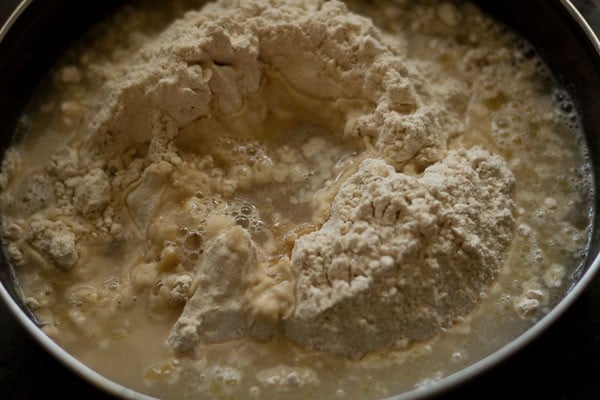
7. Bring the mixture together and knead into a smooth, soft dough for 8 to 10 minutes. Add more water if needed. Cover and keep the dough aside, letting it rest for 20 to 30 minutes.
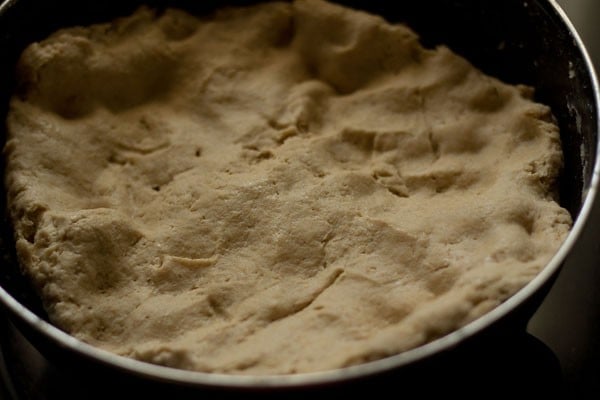
Stuff The Flatbread
Option 1: The “Double Disc” Method
8. Pinch two small balls from the dough. Flatten them and dust with whole wheat flour.
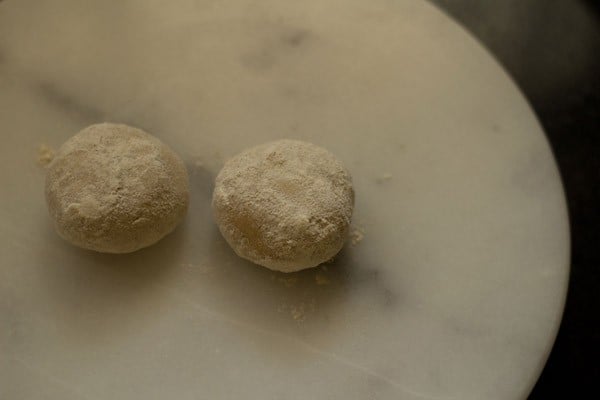
9. With a rolling pin, roll them into rounds roughly 4 to 5 inches in diameter. Try making both the discs the same size.
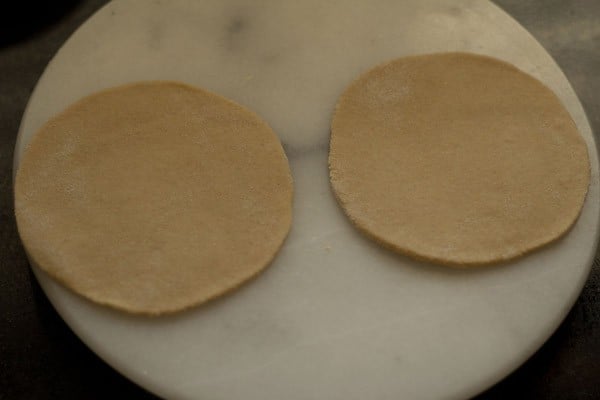
10. On one of the discs, place the potato stuffing in the center, keeping about 1 inch empty space from the sides.
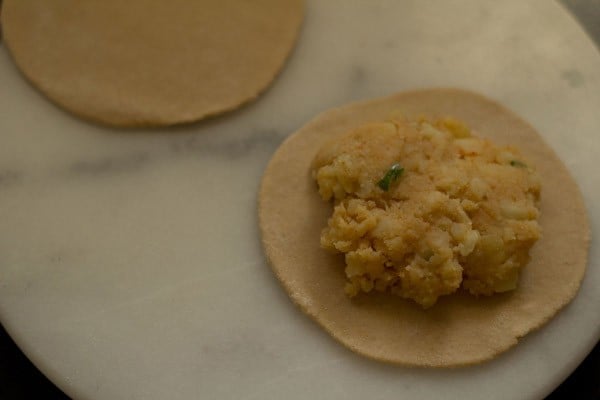
11. Gently place the second circle on top.
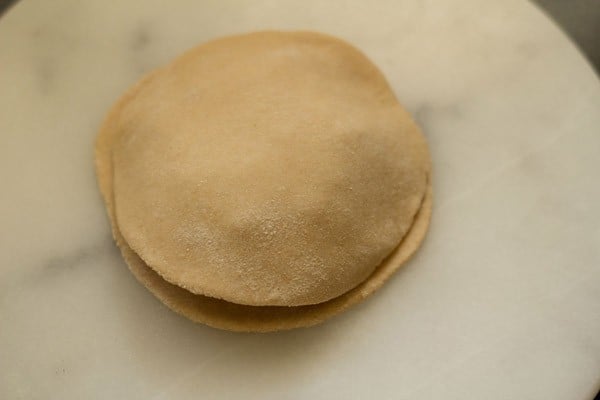
12. Press and seal the edges with your fingertips. If you are not able to seal the edges, then brush or spread some water on the edges and then seal.
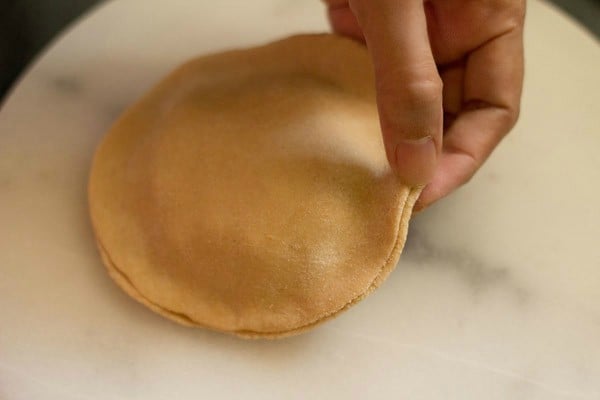
13. Dust some flour on the stuffed aloo ka paratha and start rolling.
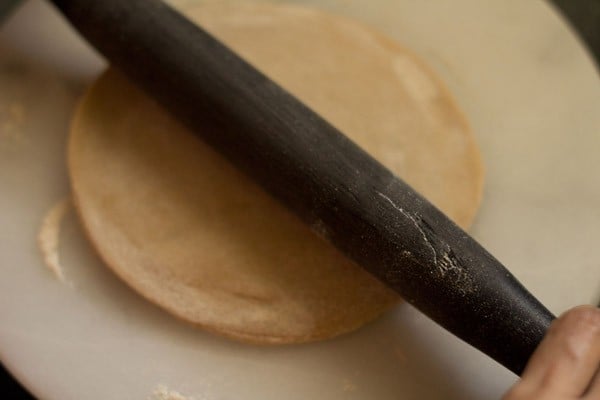
14. Roll the paratha into a round about 7 to 8 inches in diameter, or about the size of a normal roti or chapati.
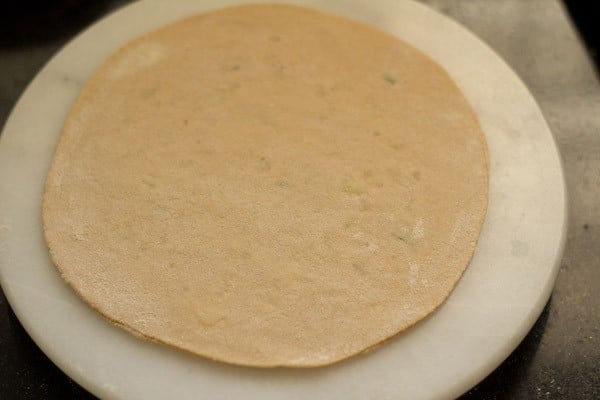
Option 2: “The Dumpling Method”
15. Pinch off a medium ball of dough. Roll it between your palms and lightly flatten it. Dust with some flour and roll to a circle about 5 to 5.5 inches diameter.
Place the potato stuffing in the center, keeping about 2 to 2.5 inches of space from the sides.
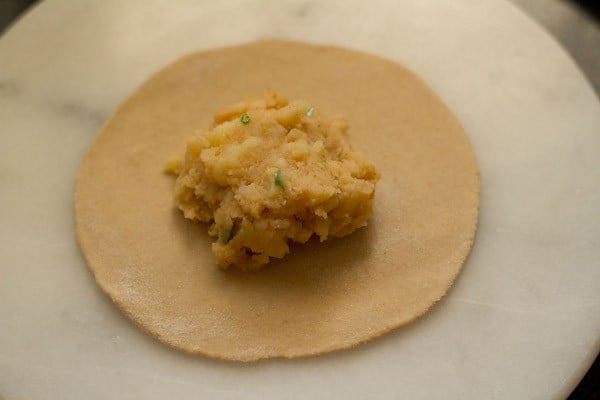
16. Take the edge and start pleating, joining the pleats in the center.
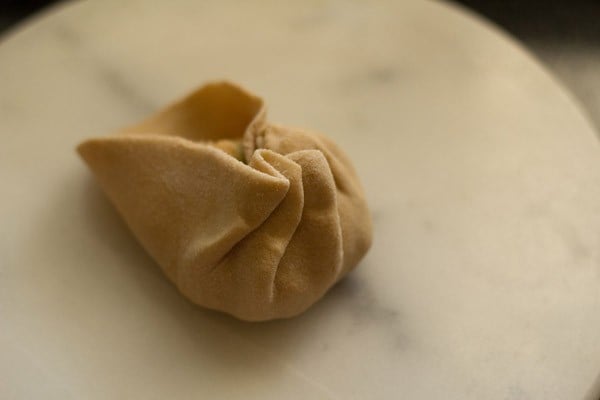
17. When all of the pleats are joined together, it should look like a Chinese dumpling. Be sure to pinch the pleats together very well so the filling doesn’t leak out while rolling.
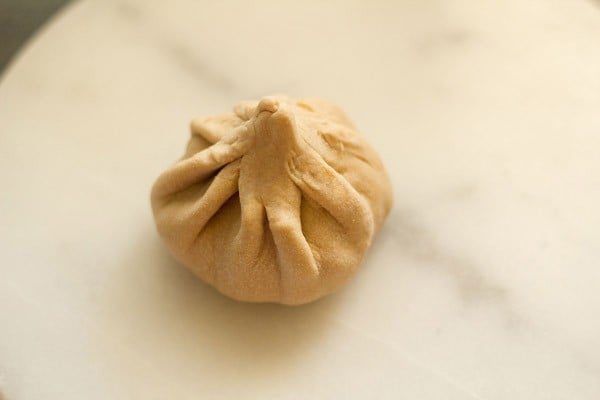
18. Press the joined top portion slightly downward to flatten it a bit.
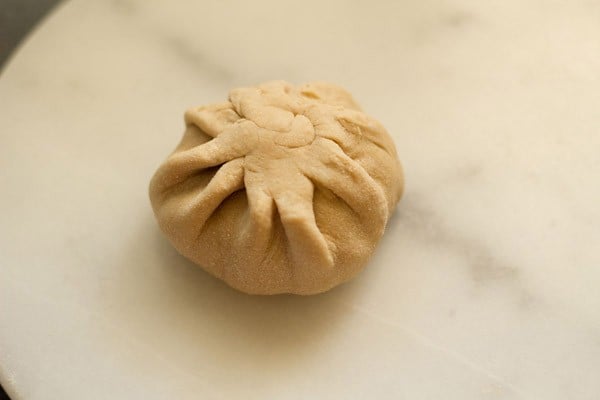
19. Sprinkle some flour and roll this version of stuffed paratha to about the same size as that of a chapati or roti. If some of the filling comes out, then just take a small piece of dough and cover the gap.
Roll, trying to create the same thickness throughout, as you would a pie dough. Avoid keeping the edges thick.
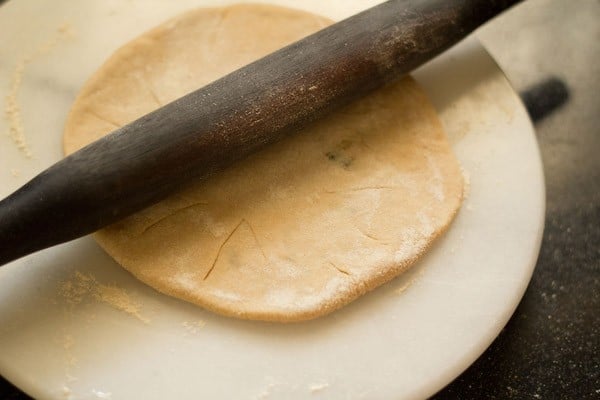
Roast Alu Paratha
20. On a hot tawa (skillet or griddle), place the rolled paratha. The tawa should be quite hot; cooking parathas at a low flame will harden them. Ideally, the finished parathas are crisp as well as soft.
– For a thick bottomed heavy tawa, keep the flame to medium-high or high.
– For a medium or thin bottomed tawa, keep the flame to medium-low to medium.
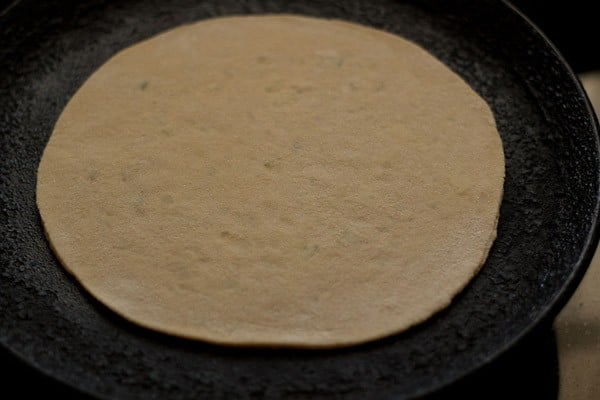
21. When the base is partly cooked, flip the paratha using a spatula. You will see some air pockets on this side.
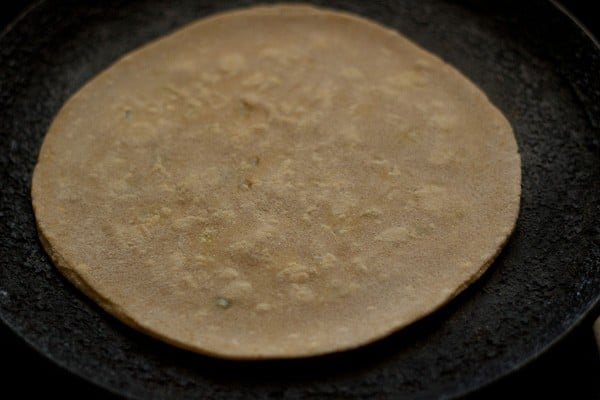
22. Spread some ghee or a neutral flavored oil (e.g. sunflower) on the partly cooked part.
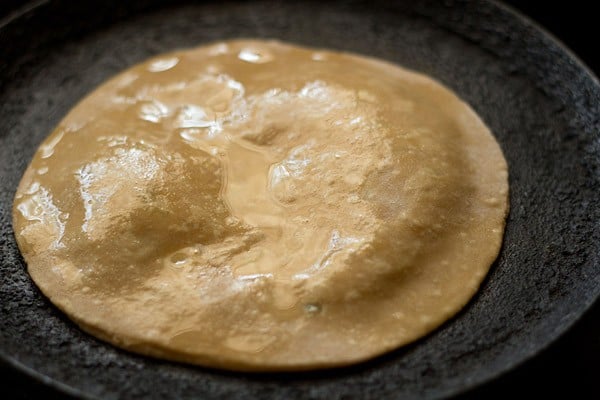
23. Flip again and you will see nice golden blisters on the second side. To clarify, the side which has been spread with ghee will be on the bottom.
This side has to be cooked more than the previous side.
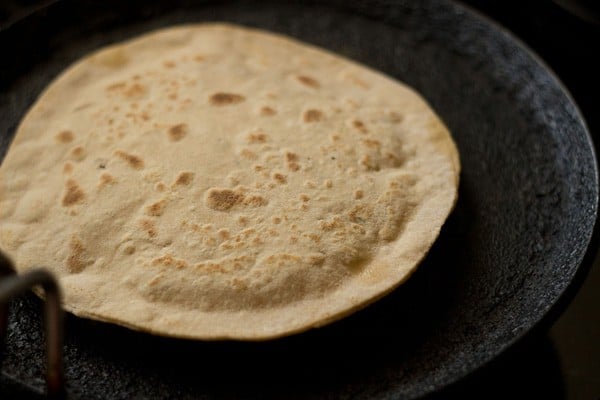
24. Spread some ghee on the second side facing you. A well-made and well-roasted alu paratha will always puff up when roasting.
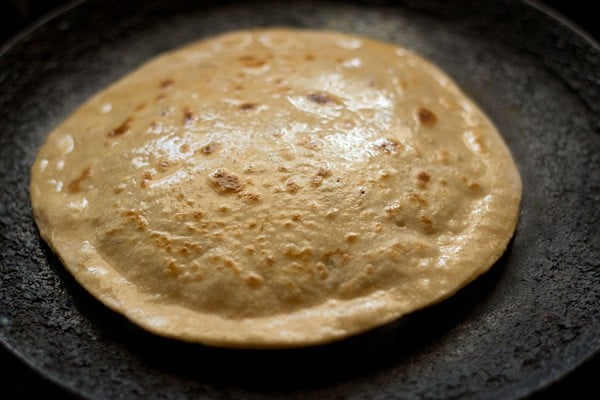
25. Flip again once or twice till both sides are cooked properly, with crisp brown spots. You should also press the alu paratha edges down with a spatula or spoon so that they are fried well. Repeat, making all parathas this way.
I usually stuff and make aloo ke parathe side by side because I love multitasking :-). After they roast, I keep on stacking them in a roti basket or casserole lined with a towel to help keep them warm.
I also add a bit of Homemade Butter on top of each paratha when I serve them.
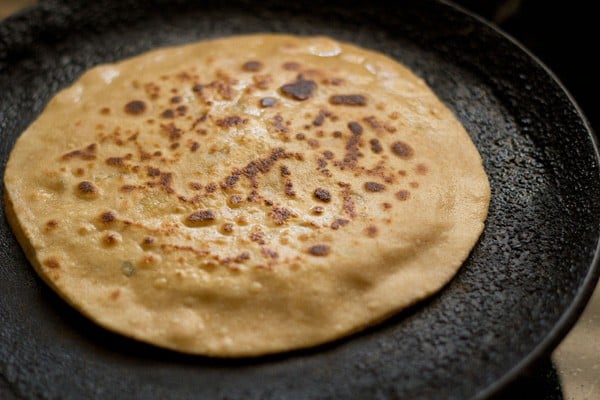
If your family is ready to eat NOW, you can also serve the aloo ka paratha directly from the tawa (skillet) to the serving plate. Serve some extra butter on the side, along with Mango Pickle, Lemon Pickle, Dal Makhani or some fresh curd (yogurt).
Cooked aloo ke paratha can also be packed in your tiffin for lunch. In fact, aloo paratha used to be my favorite tiffin snack when I was growing up! Some things never change.
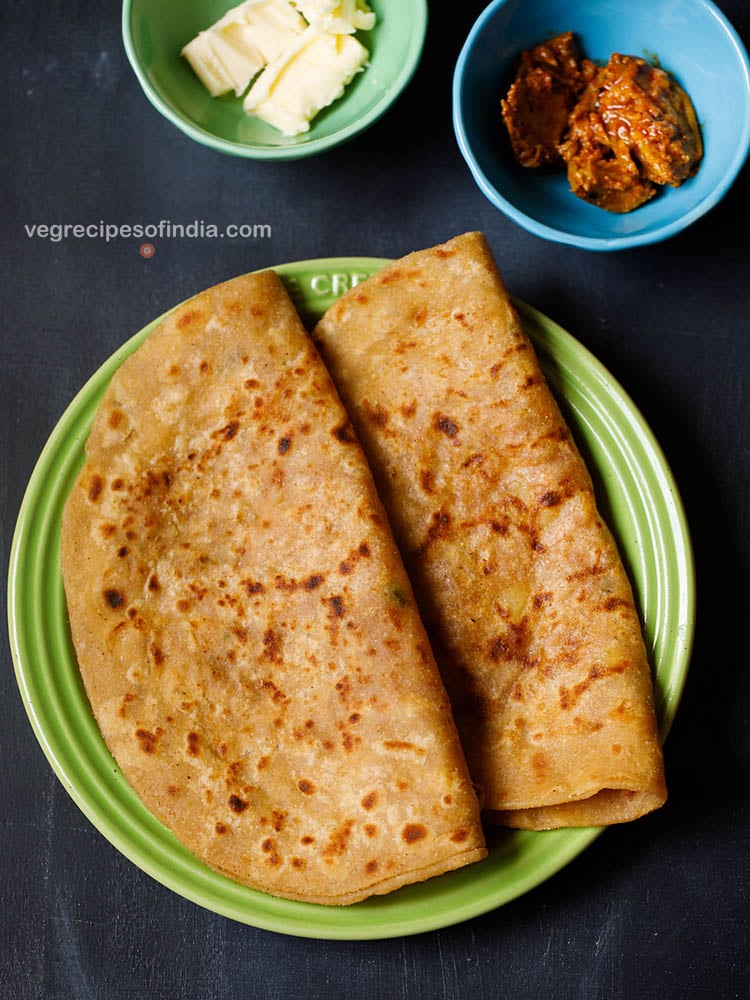
Serving Suggestions
These delightful potato stuffed flatbreads are a divine pairing with so many things:
- For a cooling element, try plain Curd (yogurt) or Boondi Raita.
- Butter (salted or unsalted) is always welcome on any bread of mine.
- A side of Mango Pickle, Lemon Pickle, or Garlic Pickle can also be served.
- You can serve aloo ka paratha like many dhabas (roadside eateries): with Dal Makhani, Chana Masala, or Kali Dal.
- You can even serve aloo ka paratha plain – it is still very delicious.
- They also make a good tiffin box snack as they stay soft even after cooling.
Flavor Variations
I love my aloo filling just the way the recipe is written, but there are a few ways to customize it to your liking. Here are a few ideas to get you started:
- Apart from the spices listed, you can also add ½ teaspoon carom seeds (ajwain) and ½ teaspoon ginger paste. Apart from these spices, you can also add roasted cumin seed powder (jeera powder), turmeric powder, black salt, dry pomegranate seeds powder (anardana powder) or coriander powder.
- For a pop of bright green color and fresh flavor, add 1 to 2 tablespoons of finely chopped coriander leaves (cilantro) or mint leaves.
- Another popular variation is to add finely chopped onions if you like. Just remember to chop the onions finely or else they pop out when rolling the parathas.
- Add grated cheese or paneer, because potatoes + cheese = yum.
Expert Tips
- Cooking potatoes – Potatoes can be boiled in either a pan or a pressure cooker. Potatoes can also be steamed. To cook potatoes in a pressure cooker or pan, add water to cover the potatoes and cook them till they are easily pricked with a fork. For pressure cooking, cook for 3 whistles on a medium heat.
- Texture of mashed potatoes – The potatoes should be mashed very well, with lumps or small pieces in it so that the parathas do not break while rolling. The texture of mashed potatoes should be light and smooth. It is always better to first grate the boiled potatoes and then mash.
- Finely chopped additions – Any additions you make to the potato mixture need to be very finely chopped, or they risk popping through the dough when you roll them.
- Oil or ghee – Either oil or ghee can be used for both kneading and pan frying. To make vegan aloo paratha, use any neutral flavored oil to both knead the dough and roast the parathas.
- Frying or roasting – Alu paratha can be either shallow fried or roasted on an iron skillet, which we call a tawa. The roadside stalls and dhabas shallow fry paratha in ghee or oil, while at home they are most often roasted. Homemade paratha is therefore usually healthier than the fried paratha available outside.
- Use an appropriate amount of heat – Keep the flame medium-high to high while roasting parathas. If the heat is low, then the parathas become dense as they take a long time to cook. In case it becomes too hot and the parathas are charring before they can cook, then decrease the flame. You can always adjust the flame when cooking parathas.
FAQs
The mashed potatoes stuffing have a slightly tangy taste from the addition of amchur powder(a.k.a. dried mango powder, made of finely ground sun-dried unripe mangoes).
If you do not have dried mango powder, an easier substitute is lemon juice. Another possible substitute is dried pomegranate seed powder (anardana powder), though this is a more rare ingredient.
First, look to the filling: you can add a few more cooked and mashed veggies like peas, carrots, or french beans. Some grated cheese or paneer can also be added to make these flat-breads more tasty & nutritious.
Secondly, consider pan-roasting the paratha in a heart healthy oil instead of ghee. I also suggest avoiding shallow frying the paratha like they do at most roadside stalls.
Since they will be peeled before use, you can use either thick skinned jacket potatoes or waxier skinned potatoes – they’ll both be great. I used russet potatoes for this recipe.
If your dough has become thin or sticky, add a few tablespoons of flour to correct it. Mix and knead the dough again.
If the dough looks dry or is not soft, add a few tablespoons of water in stages and knead again. Sometimes you may see that the dough looks sticky but as you continue to knead, the flour absorbs the water and the stickiness goes away.
More Stuffed Paratha Recipes To Try!
Breakfast Recipes
Breakfast Recipes
Breakfast Recipes
Breakfast Recipes
Please be sure to rate the recipe in the recipe card or leave a comment below if you have made it. For more vegetarian inspirations, Sign Up for my emails or follow me on Instagram, Youtube, Facebook, Pinterest or Twitter.
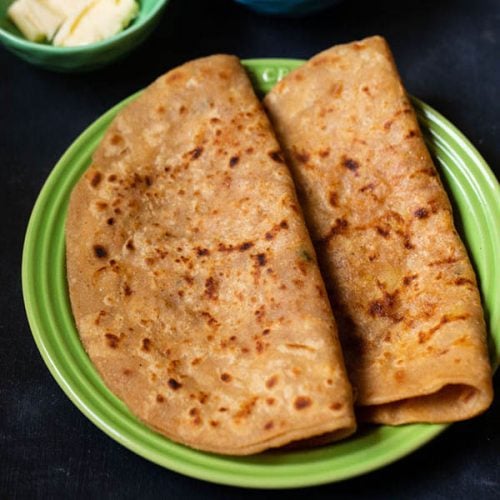
Aloo Paratha Recipe (Homemade Punjabi Style)
Ingredients
For potato stuffing
- 3 to 4 medium potatoes – boiled and mashed
- 1 to 2 green chilies – chopped finely
- ¼ to ½ teaspoon kashmiri red chilli powder or cayenne pepper or paprika, optional
- ¼ to ½ teaspoon Garam Masala
- ½ to 1 teaspoon dry mango powder (amchur powder)
- 1 tablespoon finely chopped coriander leaves – optional
- salt as required
- oil or ghee, as required for roasting paratha
For paratha dough
- 2 cups whole wheat flour
- ½ teaspoon salt or add as required
- 1 tablespoon oil or ghee (clarified butter)
- water as required for kneading
For serving
- White Butter or yogurt to serve with the aloo paratha
- mango pickle or lemon pickle – as required
Instructions
Making potato stuffing
- First boil the potatoes and peel them. You can boil or steam the potatoes in a pressure cooker, steamer or electric cooker.
- Chop and then mash the potatoes with a potato masher.
- The potatoes should be mashed very well. There should be no lumps or small pieces in it.
- Now add the chopped green chilies, garam masala powder, red chili powder, dry mango powder and salt.
- Mix the spice powders and green chilies with the mashed potatoes very well. Check the taste and add more salt or red chili powder or dry mango powder as per your taste.
Kneading dough
- In another bowl or pan, take whole wheat flour (atta).
- Make a well in the center. Add salt, oil and about half of the water.
- Bring the mixture together and knead into a smooth soft dough.
- Cover and keep the dough aside for 20 to 30 minutes.
Stuffing and rolling
Method 1
- Pinch two small balls from the dough. Flatten them and dust with whole wheat flour.
- With a rolling pin, roll them into about 4 to 5 inches diameter rounds . Try making both the rounds of the same size.
- On one of the rolled dough circle, place the potato stuffing in the center and keep about 1 inch empty space from the sides.
- Gently place the second circle on top.
- Press and seal the edges with your fingertips.
- Dust some flour on the stuffed paratha and roll into a round of about 7 to 8 inches in diameter or about the size of a normal roti or chapati.
Method 2
- Pinch a medium ball dough. Roll and flatten it. Dust with some flour and roll it in a circle of about 5 to 5.5 inches in diameter.
- Place the potato stuffing in the center, keeping about 2 to 2.5 inches space from the sides.
- Take the edge and start pleating as well as bringing the pleats in the center.
- Join the pleats together. The pleats have to be joined well, as otherwise there will be gaps while rolling and the filling comes out.
- In case you do see the filling, then just take a small piece of dough and cover the gap. Roll to smoothen out the small piece of dough.
- Press the pleats from center.
- Sprinkle some flour and roll this version of aloo paratha to about the same size as that of a chapati or roti.
Roasting
- On a hot tava (tawa or skillet or griddle) place the rolled paratha.
- The tawa or skillet be hot and not at a low temperature. Cooking parathas at a low flame will harden them. Parathas ideally are crisp as well as soft.
- When the base is partly cooked, flip the alu paratha using a spatula or tongs.
- Spread some ghee on the partly cooked part.
- Flip again and this time this side has to be cooked more than the previous side. You will see brown spots on the paratha.
- Spread some ghee on this side too. A well made and well roasted aloo ka paratha will puff up.
- Flip again once or twice till both the sides of aloo paratha are cooked properly. You should see crisp brown spots on the paratha.
- You can also press the paratha edges with a spatula or spoon, so that they are fried well. As some time, the paratha edges are not cooked well so keep this point in mind.
- Make all aloo ke parathe this way and stack them up in a roti basket or casserole.
- You can also serve the aloo paratha directly from the tawa (skillet) straight in the serving plate. Serve some extra butter on the side, along with mango pickle or lemon pickle or garlic pickle or some yogurt.
- If you are serving them as an evening snack then you can also serve them with a cup of hot tea or lassi.
Notes
- Adding oil or ghee while kneading the dough makes the parathas soft.
- The aloo stuffing mixture can be made according to your taste and liking. You can also add roasted cumin powder (jeera powder), rock salt, carom seeds, mint leaves and coriander powder.
- To the aloo stuffing, you can also add other boiled and mashed veggies like peas, carrot, french beans, also grated cheese and paneer, to make it more nutritious and you have your mix veg paratha.
- Always cut the onions, chillies, coriander leaves very finely. Also, the aloo should be mashed very well. There should not be any lumps or small pieces in it. This is so, so that, the parathas do not break while rolling.
- If you do not have dry mango powder, then you can use dry pomegranate seeds powder (anardana powder) or lemon juice. Add according to your taste and preferences. But don’t make the stuffing taste too much sour. So add in bits, mix and do a taste test.
- To vegan aloo paratha, roast the paratha with oil instead of ghee. Also use oil while needing the dough.
Nutrition Info (Approximate Values)
This Aloo Paratha recipe from the blog archives was first published in Aug 2009. It has been updated and republished on November 2022.
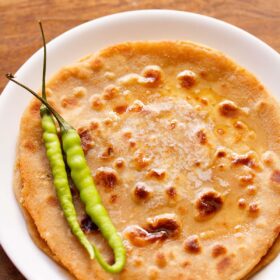
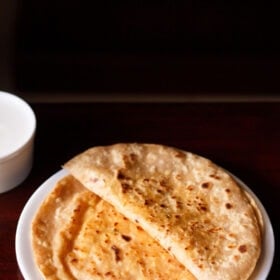
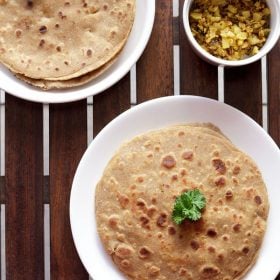
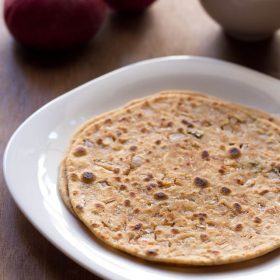
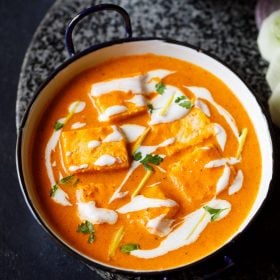
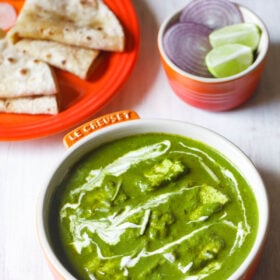
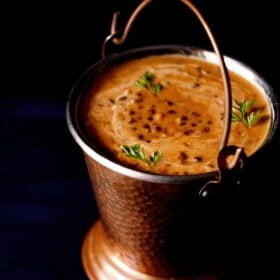
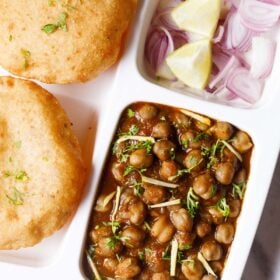








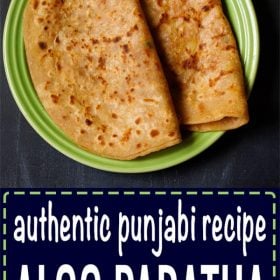
The recipe is very good. My kids liked it very much. Your way of teaching the recipes is good. It is motivating me towards trying new dishes which is not my interest. So many thanks to you.
welcome sudhamani. glad to know this. thanks for sharing your encouraging feedback.
I’ve tried this at Indian restaurants where I live and always wanted to try it at home.
Then I found your blog and for the fist time in my life I made aloo paratha and I’m glad I did! Thank you very much for your perfect recipe and also for the lovely picture illustrations!
welcome samudri. glad to know this. thanks for sharing positive review on aloo paratha recipe.
Aloo paratha was really great..your step by step recipe descriptions are awesome..its like a tutor teaching live.thanks a lot.wonderful site
welcome ramya. thanks for sharing positive review on aloo paratha and for your appreciation.
I tried this recipe and my spouse really loved it. Thanks a lot, keep posting amazing recipes.
welcome prabhat. glad to know this.
I jus loved the aloo paratha. I followed step by step n got it perfect especially technique of making paratha after stuffing was very useful
kids enjoyed the paratha with tomato ketchup
thanks anu for sharing positive feedback on aloo paratha. glad to know this.
Fantastic andEasy
Thanks for wonderful recipe and the step by step explanation using pictures…
welcome benazir
Thank you for the wonderful and simple process with great pictures at every step.
welcome venkata
everyday new receipe
Thanks for clear instructions and recipe.
welcome ray
Hey,
It was really helpful. Really nice work. Keep up the good work & wanna say thank u.
Welcome EMB
Thanks!!!!
welcome varda
Hi Dassana,
I love all your recipes..I hated cooking but after coming across you website.im become quite a good cook n it has encouraged me a lot.Thanks for your hard work and delicious recipes.God bless 🙂
welcome meryl. thanks for your sweet feedback and blessings.
delisious …i like very much..
When I open the site in my samsung mobile , it starts downloading one application and i am unable to browse the pages. plz check.
Also plz let me know whther you have any APP for this site
thanks ganga for informing us. we are looking into this issue. we don’t have a App.
Hi.. Ur recipes are very wonderful…. And aloo paratha looks very yummy…. Wen i roll d paratha i am trying to fix firmly both d chapatis edges and roll it properly with sum flour but as i put paratha on d tawa the edges become open and it looks in two pieces.. I tried so many timez but most of the time it happens to me… By dis method i just wanted to make a paratha.. Plz help mam..
thanks. a tip would be to brush some oil on the circumference and then join the edges. then the paratha won’t break while roasting.